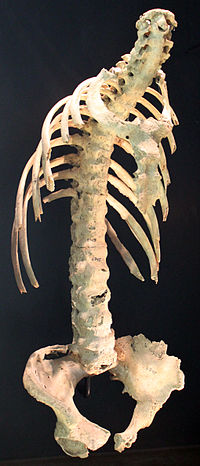
Photo from wikipedia
Abstract Objectives: The aim of this study is to assess the current situations of standard exercise treatment and predictors of non-standard exercise in Chinese patients with ankylosing spondylitis (AS). An… Click to show full abstract
Abstract Objectives: The aim of this study is to assess the current situations of standard exercise treatment and predictors of non-standard exercise in Chinese patients with ankylosing spondylitis (AS). An analysis of the effect of standard exercise on health-related quality of life (HR-QoL) was also conducted. Methods: In the cross-sectional study, a total of 259 AS patients were constantly invited to participate in this study and complete the questionnaire under the researchers’ supervision in a clinical setting including sociodemographic variables, clinical variables, psychological variables, and HR-QoL. Data were analyzed by Mann–Whitney U test, Chi-square test as well as multivariable analysis of Binary Stepwise Logistic Regression. Results: The data showed that just 20.5% of them could complete the standard exercise. Exercise adherence was associated with employment, educational level, marital status, place of residence, treatment of Tumor Necrosis Factor-α inhibitor, knowledge about exercise, disease duration, clinical variables, and anxiety. The HR-QoL in the group of standard exercise was better than that in the non-standard exercise group. Logistic Regression Analysis showed that lower educational level, less knowledge about benefits of exercise treatment and higher score of Bath Ankylosing Spondylitis Disease Activity Index (BASDAI) were the independent risk factors of exercise treatment non-adherence. Conclusion: AS patients educated less than 9 years or with higher BASDAI score were more likely not to adhere to standard exercise treatment. Non-adherence to exercise treatment among AS patients is exceedingly common, particularly in patients without knowledge about benefits of exercise treatment. Standard exercise treatment can also improve HR-QoL of AS patients.
Journal Title: Modern Rheumatology
Year Published: 2018
Link to full text (if available)
Share on Social Media: Sign Up to like & get
recommendations!